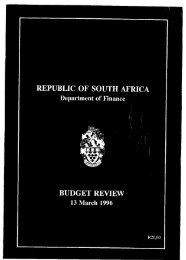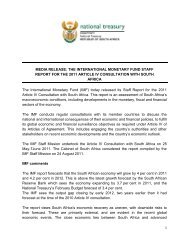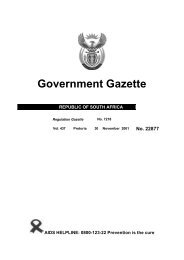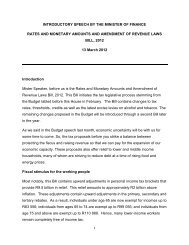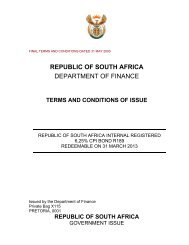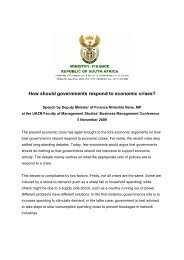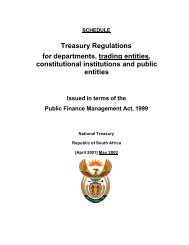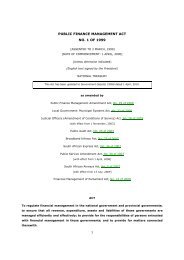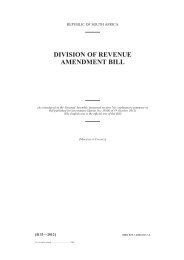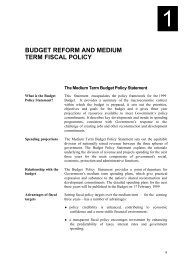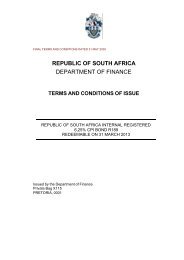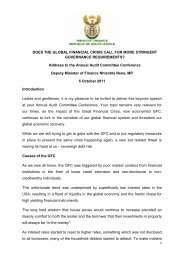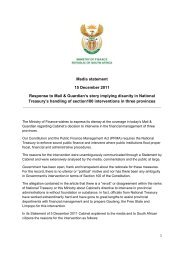1998 SOUTHERN AFRICA ECONOMIC ... - National Treasury
1998 SOUTHERN AFRICA ECONOMIC ... - National Treasury
1998 SOUTHERN AFRICA ECONOMIC ... - National Treasury
Create successful ePaper yourself
Turn your PDF publications into a flip-book with our unique Google optimized e-Paper software.
Southern Africa and Competitive n e s s<br />
This ye a r ’s theme at the Southern African Economic Summit of<br />
the World Economic Fo r u m , is “Priorities for Global<br />
C o m p e t i t i veness in the 21st Century ”.O ver the past few ye a r s ,<br />
m a ny of the Southern African Development Commu n i t y<br />
(SADC) economies have moved aw ay from isolation and<br />
patterns of low growth - South A f r i c a ’s ap a rtheid regime has<br />
been dissolve d , dictatorships have been replaced by<br />
democracies and economic policy in general is moving rap i d ly<br />
t ow a rds free market principles. N ow, t h e re is an incre a s i n g<br />
amount of international attention being paid to Southern A f r i c a ,<br />
which is beginning to be seen as a region with enormous<br />
p o t e n t i a l .<br />
In terms of competitive n e s s , h oweve r, S A D C, as a whole lags<br />
behind the developed wo r l d , as well as behind some of the<br />
other so-called “emerging markets” such as China, South East<br />
A s i a , Latin America and Eastern Euro p e. H aving embraced the<br />
policy logic of the free market and its implications - minimising<br />
state intervention in the economy, l owering barriers to trade<br />
and attracting fo reign inve s t m e n t ,among others - the countries<br />
of Southern Africa have no option but to accept the realities of<br />
the economic env i ronment in the 21st Century. Te c h n o l o gy is<br />
advancing at a rapid rate, the volume of cro s s - b o rder cap i t a l<br />
f l ows is expanding, i nvestors are incre a s i n g ly looking outside<br />
their traditional boundaries for new opportunities and new<br />
w ays of making money ; in short , the world is becoming smaller.<br />
On top of this, donor aid to developing countries is not as<br />
fo rthcoming as it used to be. To be players in the wo r l d<br />
e c o n o my in the next century, the countries of Southern A f r i c a<br />
will need to become more competitive, and to develop some<br />
w ay of holding their own against the dominant fo rc e s .<br />
The Africa Competitiveness Report<br />
A f r i c a ’s entry into the world economy is evidenced by the<br />
p roduction (for the first time) of the Africa Competitive n e s s<br />
R e p o rt .Compiled for this ye a r ’s World Economic Forum (held<br />
in Davo s , Switzerland in Janu a ry / Fe b r u a ry) the re p o rt looks at<br />
24 African countries and evaluates them in terms of their<br />
c o m p e t i t i ve n e s s .Conclusions are based on a survey of A f r i c a n<br />
b u s i n e s s ,as well as data collected from sources such as the<br />
World Bank, the International Monetary Fund, the UN, a n d<br />
African ministries of finance and central statistical offices. A l l<br />
SADC countries, with the exception of the Democratic<br />
Republic of Congo and the Sey c h e l l e s ,a re included.<br />
Topping the overall Competitiveness Index (calculated on the<br />
basis of six indices - openness, gove r n m e n t , f i n a n c e, l a b o u r,<br />
i n f r a s t r u c t u re and institutions) is Mauritius. Other high-ranking<br />
SADC countries include Botswana (3), Namibia (4) and South<br />
Africa (7). Swaziland (8), Lesotho (10), Zambia (12) and Ta n z a n i a<br />
(16) fall into the middle rankings, whilst Mozambique (18),<br />
Z i m b a b we (20), M a l aw i(21) and A n gola (23) are near the<br />
bottom of the table.<br />
The re p o rt explains Mauritius’s and Botsw a n a ’s re l a t i ve ly high<br />
l evel of competitiveness in terms of the stability (both political<br />
and economic) of the countries, as well as we l l - m a n a g e d<br />
economies and sound macroeconomic policies which have been<br />
in place for some time. The re p o rt also found evidence of<br />
“ g e o g r aphic bunching”, i . e. countries in a certain geograp h i c a l<br />
a rea tended to have similar rankings - this is most notable in<br />
relation to the Southern African Customs Union countries. A<br />
c o rrelation between competitiveness and human we l f a re was<br />
also noted, suggesting that competitiveness could contribute to<br />
higher levels of human deve l o p m e n t ,and vice ve r s a .<br />
Countries generally re g a rded as “ good re formers” (e. g .<br />
Mozambique) did not necessarily fare well in terms of<br />
c o m p e t i t i ve n e s s illustrating , that real change does not take place<br />
overnight and that time is needed to strengthen institutions,<br />
i n f r a s t r u c t u re and the economy in general. W h e re countries<br />
such as Mozambique did obtain high rankings was in terms of<br />
t wo new indices, the Improvement Index and the Optimism<br />
I n d e x .Data for these indices was obtained from “ d i rection of<br />
change” questions in the survey. Tanzania (3), Mozambique (4)<br />
and Zimbabwe (6) we re, a c c o rding to the re p o rt , the thre e<br />
countries which showed the most improvement in terms of<br />
business env i ronment over the years 1992-97. M o z a m b i q u e<br />
topped the Optimism Index for the years 1997-99; b u s i n e s s e s<br />
we re also optimistic about the prospects of Tanzania (2) and<br />
Zambia (6). The re p o rt explains the re l a t i ve ly low ranking of<br />
countries such as Botsw a n a ,N a m i b i a ,Mauritius and South A f r i c a<br />
in these indices part ly in terms of contentment rather than<br />
p e s s i m i s m ,although obviously in the case of South A f r i c a ,f a c t o r s<br />
such as crime and the instability associated with transition play<br />
a major role as we l l .<br />
O ve r a l l , the re p o rt emphasises the importance of go o d<br />
government and good leadership as one of the pre requisites of<br />
a successful economy. This encompasses political and policy<br />
stability and transparency between business and gove r n m e n t .<br />
Other areas of particular importance to the business<br />
c o m munity we re found to be openness to trade, i m p rove d<br />
i n f r a s t r u c t u re and low levels of corr u p t i o n .<br />
In the “ E s s ays” section of the Africa Competitiveness Report ,<br />
the authors and contributors go into greater detail about issues<br />
such as fo reign direct investment flow s , g l o b a l i z a t i o n ,p o l i t i c a l<br />
aspects of the re form process and developing competitive<br />
a d v a n t a g e.The message of the re p o rt is clear:state interve n t i o n<br />
in the economy should be kept to a minimu m , fo re i g n<br />
i nvestment is crucial to grow t h , no economy can function in<br />
i s o l a t i o n , economies should focus on developing a stro n g<br />
gove r n m e n t ,good leadership and well-functioning institutions<br />
a re import a n t .<br />
The Africa Competitiveness Report highlights both how far<br />
Southern Africa has come, and how far the region has to go<br />
b e fo re becoming a “success story ” . Instead of taking rigid,<br />
fo r mulaic ap p roach to re fo r m , the re p o rt offers frank and<br />
practical discussions of problems which are uniquely A f r i c a n .<br />
Southern Africa as a region has had its own singular history and<br />
often the difficulties faced by policy makers today are as a re s u l t<br />
of the legacy of Southern A f r i c a ’s past.The re p o rt recognises the<br />
distinction between policy and implementation and that<br />
something that looks good on paper may not necessarily wo r k<br />
in practice. F u rt h e r m o re, the re p o rt recognises the potential of<br />
countries which are still battling to ove rcome the effects of<br />
political turmoil and badly-managed economies. S A D C<br />
countries would there fo re do well to take heed of the re p o rt .<br />
Regional Integration and Competitive n e s s<br />
One area which the Africa Competitiveness Report does not<br />
m a ke much mention of is the benefits of regional integration in<br />
terms of competitive n e s s .The World Investment Report (1997)<br />
e x p l o res the possibility of South Africa becoming a “ g row t h<br />
17



